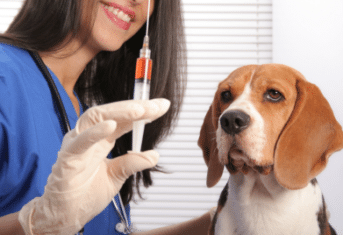Top 5 Health Issues Facing American Pets Today

Top 5 Health Issues Facing American Pets Today
1. Pets are becoming medically underserved
Data shows the pet population in the U.S. is climbing, but visits to veterinarians are declining. On an annual basis in 2007, dogs saw a veterinarian 2.6 times per year and cats only 1.7 times, indicating cats are affected more than dogs. This number has continued to decline in the aftermath of the Great Recession of 2008. Taking your cat or dog to the veterinarian allows early detection and intervention before medical problems like obesity cause serious disease.
2. Obesity in pets, like in humans, is skyrocketing
Veterinarians know pets are getting fatter, but research has shown pet owners are not likely to recognize obesity in their pets, perhaps because they themselves are overweight. In dogs, obesity is linked to an increased body mass index (BMI) in their owners. If you love your pet and want it to live a long, healthy life, keep its weight down. Obese pets have a shorter lifespan and increased risk of cancer, heart disease, respiratory problems, bladder disease, and, like humans, diabetes.
3. Diabetes is increasing in both cats and dogs
Banfield State of Pet Health reports a 32% increase in diabetes in dogs and 16% increase in cats, comparing 2006 to 2010. This is likely tied to the obesity epidemic in pets. Diabetes can be treated in dogs and cats, but it involves someone in the family injecting insulin once or twice daily under the skin and monitoring response to treatment. Preventing diabetes by maintaining an ideal body weight is simply easier for everyone.
4. Cancer: a major illness in both cats and dogs
According to the Morris Animal Foundation, 1 in 4 dogs dies from cancer and cancer is the leading cause of death in dogs over 2 years of age.
In dogs, breed is strongly associated with specific types of cancer. Golden retrievers commonly develop lymphoma, German shepherds a splenic tumor called hemangiosarcoma, and Pugs a skin tumor known as a mast cell tumor. Cats get cancer too, most commonly lymphoma. Annual examinations and blood tests by your family veterinarian will help to detect tumors while they are still easily treatable.
5. Dental disease is on the rise
Reluctant is the descriptor for many pet owners when it comes to dental procedures in their pets. I understand their concern for the required general anesthesia, but I am concerned their reluctance is compromising their pet’s health. Periodontal disease is very prevalent in cats and in one study, all cats had evidence of periodontal disease. Over 10% were severely affected and nearly all had bone loss in the jaw as determined by dental x-rays.
Having periodontal disease may cause collateral damage in other parts of your pet’s body. In dogs, periodontal disease was associated with increases in markers of systemic inflammation and indicators of failing kidney function, and was also associated with endocarditis and heart muscle problems.
For more information on healthcare issues facing American pets today, watch my video interview with Yahoo! Animal Nation.
Photo: iStockphoto
________________________________________________________
This may also be found in the Tales from the Pet Clinic blog on WebMD.com.
For over a century, The Animal Medical Center has been a national leader in animal health care, known for its expertise, innovation and success in providing routine, specialty and emergency medical care for companion animals. Thanks in part to the enduring generosity of donors, The AMC is also known for its outstanding teaching, research and compassionate community funds. Please help us to continue these efforts. Send your contribution to: The Animal Medical Center, 510 East 62nd Street, New York, NY 10065. For more information, visit www.amcny.org. To make an appointment, please call 212.838.7053.


































